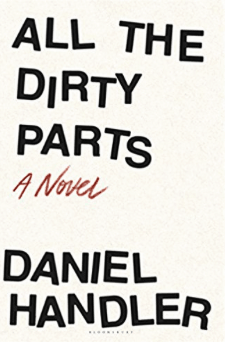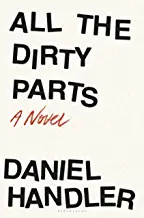All the Dirty Parts by Daniel Handler
 BookTrib is partnering with Bookish to bring you more great content. You may know Daniel Handler by another name: Lemony Snicket, the author of the Series of Unfortunate Events books. When he isn’t writing about the Baudelaire siblings, Handler is penning adult and young adult novels under his given name. We were lucky enough to catch up with Handler at BookExpo America to chat with him about his new novel, All the Dirty Parts. In it, a high schooler named Cole experiences firsthand the complexity of the “uncomplicated” relationship. Check out our conversation with Handler below.
BookTrib is partnering with Bookish to bring you more great content. You may know Daniel Handler by another name: Lemony Snicket, the author of the Series of Unfortunate Events books. When he isn’t writing about the Baudelaire siblings, Handler is penning adult and young adult novels under his given name. We were lucky enough to catch up with Handler at BookExpo America to chat with him about his new novel, All the Dirty Parts. In it, a high schooler named Cole experiences firsthand the complexity of the “uncomplicated” relationship. Check out our conversation with Handler below.
Bookish: This story is, as the title suggests, is a love story in pieces—what the reader has is literally all the dirty parts. How do you think the story would have been different if the other parts had been included?
Daniel Handler: Well, I don’t think it’s possible to write the whole story of everything, and part of what this book came out of was the way in which sexuality is ignored or pushed aside in so much literature. And that’s a really big part of it—it’s part of the anxiety, and the desire, and the joy, and the anger and sorrow of young relationships. Not that we grow out of it later or anything.
When I wrote Why We Broke Up, it was the first time when I went out to talk about the book that there was a big gender imbalance in my audience. It had always been kind of 50-50, and this time it was like 95% women. And that’s also, in adolescence, when many boys fall off of pleasure reading altogether. I did not fall off of pleasure reading when I was in adolescence. I started looking at what I read, what I really liked, and I saw that it had a really strong sexual streak in it. It was high-minded literature, but like, The Unbearable Lightness of Being is a really powerful work when you’re 15. If you go back and read it, you realize that it’s full of threesomes, and you just think about what was interesting to you. So I was thinking about what segment of the population was falling off of reading.
That was a long way of not answering the question. How would it be different? It’d be longer.
Bookish: All the Dirty Parts is being billed as a companion novel to Why We Broke Up. Could you talk about how you see these two novels as being in conversation with each other?
DH: I think that Why We Broke Up is extremely romantic, and comes to sexuality through romance and that All the Dirty Parts is kind of the opposite—it comes to romance through sexuality. Certainly you can look at that as being gendered—that’s part of our own gender dysfunction around relationships, particularly when we’re young: Boys need to be nice to girls in order to get laid, and girls need to give it up to be girlfriends. So I thought about the ways those overlap: boys’ desire for romance and girls’ desire for sexuality, and how both those things are divisive.
Bookish: All the Dirty Parts reminded me of Portnoy’s Complaint by Philip Roth. Both are explicit books about men whose lives are more or less ruled by sex. What drew you to this form as a vehicle for the story?
DH: It was actually the form that I found when I started thinking about books that are more fragmentary by Mary Robison, and Jenny Offill, and Maggie Nelson, and all these writers who are doing things in little, small parts. I got interested in that, and that kind of matching, not only the way sex can work in the imagination, but also the kind of fragmented, text-based conversations. It began to seem like the right vehicle to write a book in which those issues could be explored.
Why We Broke Up, for instance, is a long, written letter. That’s a very romantic idea, but it’s not realistic that you’d write a book-length letter to your ex-boyfriend. It’s not feasible.
I did a bunch of things I never thought I would do. I thought I would never write a fragmentary book. I like it a lot but I didn’t think it was my jam. I used to rant against books that had no quotation marks in them—I was kind of like, “Sorry, that’s how we do things.” But the way so many people communicate now, between talking and talking on the phone and emailing and texting and whatever else—it’s all kind of in the loam and I didn’t want to make any kind of division within that. In the book you often can’t tell when the characters are in the same room and when they’re not, and I like that.
Bookish: In this book, as in your Series of Unfortunate Events books, adults are unhelpful at best. The effect is that the younger characters are the only ones whose motives and actions make sense. Can you talk about why you write younger and older characters so differently?
DH: I think I’ve always done that. In my first book, The Basic Eight, there’s a high school girl and her parents are completely absent from the book and horrible things are happening. I think that it’s a major part of adolescence, that compartmentalization. You go to school or wherever you go and you’re in this huge thing that’s happening with people your own age and then you go home, and you’re a kid. I think even now that I’m a parent of an adolescent, and I meet so many parents of adolescents, I see that same division going on all the time. Even if you’re really close and you sit around the breakfast table and you talk about things, there’s still a whole world that’s happening that’s completely out of your hands. I eavesdrop on a lot of teenagers on public transportation and I have such a memory of being on the same public transportation–I grew up in San Francisco and I live there–literally the same buses, and I don’t remember anyone older than I am ever being on those buses and now, sure enough, I’m completely invisible when I’m there.
Bookish: You write in the book, about uncomplicated sex, that if you can’t see the complication, you’re probably it. This seems like the central realization for Cole over the course of the novel, and it emerges slowly. Why do you think this is such an important epiphany for him?
DH: Because I think the sex in his world is being un-compartmentalized. It has nothing to do with his friends, even as one of his friends becomes sexually involved with him. It has nothing to do with the way he spends his time—it’s something that he sneaks off to do. To realize that it’s all part of the world that we’re in is a big maturation process.
Bookish: This book subverts the trope that women are the ones to “catch feelings” in a relationship—in your book, it’s the male partner who does. Why did you make that decision?
DH: It just seemed like the way the story was heading, I guess. I like to be surprised when I’m reading a book, so when I’m writing a book, I think about what would be surprising. I try to avoid the pitfalls of cliché and particularly with gender, it’s so easy to see when you’re planning a book how deep those clichés are and how easy it is to fall into them.
Bookish: What’s next for you?
DH: I have a picture book coming out in the fall. And then I’m finishing an adult novel and a Snicket book, so I’ll continue to keep one foot on each side of the seesaw I guess.




